'Lewis Hamilton's worst performance for years - and he still edges closer to the title'
- Published
- comments
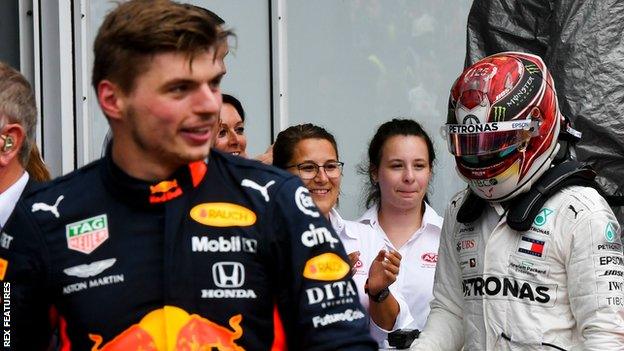
What next for Hamilton and Mercedes after a nightmare German GP?
It says something about the apparent inevitability of Lewis Hamilton winning his sixth world title this season that, after his worst performance for years, the Mercedes driver left the German Grand Prix with his championship lead actually slightly bigger than it was when he arrived.
And yet events throughout a remarkable race at Hockenheim on Sunday also underlined that nothing can ever be taken for granted in Formula 1.
Who would have predicted as Hamilton came into the pits for fresh tyres after leading comfortably for the first 28 laps that he and Mercedes were about to embark on a series of errors so uncharacteristic for a team that had until then made everyone else in F1 look second rate this year?
Within 20 laps, Hamilton was down in 12th place and asking his team: "How's it gone this bad?"
Five laps after that, Hamilton was spinning at Turn One, making another pit stop and rejoining in last place.
It looked a golden opportunity for his team-mate Valtteri Bottas - then running fourth but with a Toro Rosso and a Racing Point just ahead - to carve chunks out of Hamilton's lead and reignite his own fading title hopes. Only for the Finn to crash heavily at the same corner.
Then four hours after the end of the race, Alfa Romeo's cars were demoted out of the points for a technical infringement, and Hamilton promoted to ninth. And so the world champion left Hockenheim, after what he described as "one of the worst weekends I can remember", with his advantage extended to 41 points.
Wacky races at Mercedes
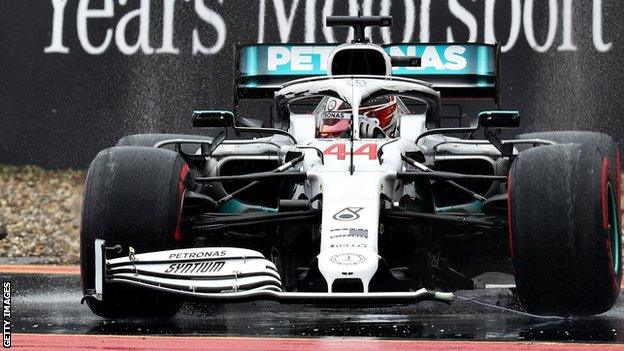
"I don't really care where everyone else finished," Hamilton said. "I was in the lead and I finished pretty much last."
Hamilton, who was still feeling the effects of the illness that earlier in the weekend had left him wondering whether he would even be able to compete, looked in total control for nearly half the race.
Slowly pulling away from Bottas behind him, with Red Bull's Max Verstappen pressuring the Finn but unable to pass, and Ferrari's Charles Leclerc looking dangerous but manageable in fourth, it appeared Hamilton's to lose. And then lose it he did. But not before Leclerc had done the same.
Lap 25 - with the track drying, and tyres wearing out, but rain still falling - was an agonising moment for drivers and strategists alike.
Verstappen stopped for dry-weather tyres, only to spin on them in the stadium on his out lap but manage to keep going.
Backmarkers who had done the same were starting to show signs of going quicker, so Ferrari called in Leclerc on lap 27 for slicks - choosing the softs for best grip rather than the mediums Red Bull had given Verstappen, much to the Dutchman's chagrin.
A lap later, Hamilton also pitted for slicks, and so began the chain of events that unravelled his race.
As Hamilton pitted, Leclerc slid into the run-off area at the penultimate corner. The 21-year-old had gone wide there twice before. But this time, on slick tyres on a damp track, he went further in, and discovered a surface that looked like it had been washed with soap suds.
The result gave the impression of an F1 car that had just encountered a kids' slip-n-slide, and Leclerc slid helplessly into the gravel and out of the race, having looked like he might be able to challenge for the lead, Ferrari's strategy decisions all bang on up to that point. The safety car was deployed.
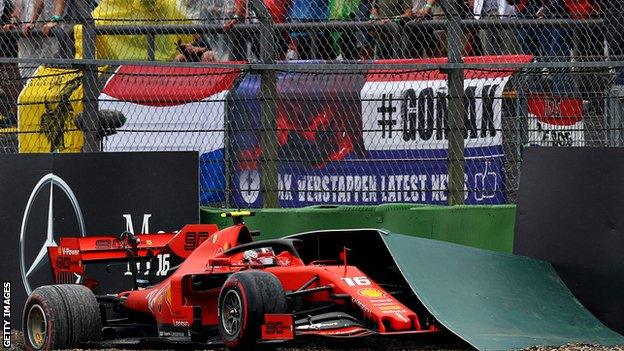
Leclerc had looked good for a podium finish but collided with the wall at the penultimate corner
At the end of his out lap, just like Leclerc, Hamilton made the same mistake, slightly further around the corner. He hit the barrier. He somehow managed to avoid getting beached like the Ferrari, but had damaged his front wing, and needed to pit to replace it.
To pit, he had to go the wrong side of a bollard on pit entry. That earned him a five-second penalty. In the pits, the team weren't expecting him. As the wing was changed, other mechanics ran around as the team vacillated over which tyres to fit, like something out of the Keystone Cops. It took a full 50 seconds for Hamilton to rejoin the race, which he did in fifth place.
There was a restart, and Hamilton got himself up to third. But then there was another safety car - after Renault's Nico Hulkenberg became the third driver to fall foul of the penultimate corner, again tossing away a great chance of a strong result, as the German has done so many times before.
Verstappen, who had inherited the lead when Hamilton crashed, pitted for fresh, treaded intermediate tyres. Hamilton didn't. He asked why - and was told that they would have lost too many positions to other cars because they would have had to take the five-second penalty as well.
But the answer did not seem to make sense because the time loss from the penalty would be less severe if he stopped under safety car conditions, he would not be losing out to anyone who would have been that difficult to pass - he might have dropped behind Toro Rosso's Alexander Albon, or he might not - and he was likely going to have to stop again anyway.
Sure enough, at the end of this safety car period, Toro Rosso and Racing Point made the decision to stop that earned Daniil Kvyat and Lance Stroll third and fourth places. Then after two laps of racing, Hamilton had to stop anyway. And even that was too late.
It was a lap after Verstappen, who pitted again to swap the intermediates he had fitted a few laps before for slicks, and Bottas. So while they rejoined in first and fourth places, Hamilton dropped to 12th. And then to top his afternoon, Hamilton spun at the first corner five laps later and had to stop again to replace his damaged tyres and rejoined plumb last.
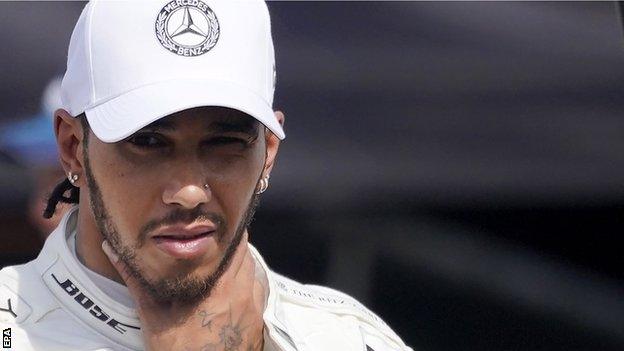
Hamilton tweeted after the race: "I'm going home to try and sleep this off"
'It's really hard when you're ill to perform at a great level'
Doing his interviews, before attending the Mercedes debrief, Hamilton was understandably reeling from what had happened.
"These weekends are sent to try you but what I can say is health is everything," he said. "This weekend I could feel for all the people who are sickly in hospitals, who are going through difficult times. I felt even more for them this weekend just knowing how horrible it does feel being ill.
"Obviously my illness is minuscule compare to a lot of people's but it felt like the world was ending for me for a lot of time. So I have a lot of sympathy for them.
"But otherwise, it is really hard when you do have that to perform at a great level. I managed to pull it out over a single lap (in qualifying). But I really thought today was going to be tough, especially being wet.
"I did pretty well up until the first stop and then it was just a cascade of decisions made. Going to the slick tyre; I wasn't sure it was slicks anyway, and then they put them on, and then I went off, then I had to come in, then they weren't ready and it just went on and on and on.
"It was just hard out there for everyone. I don't really care where everyone else finished. I was in the lead of the grand prix and I finished pretty much last. That's definitely very painful. I don't even know how."
Later, he added: "The turning point was when they put slicks on and it was still wet. Others had put slicks on but I had stayed out because it was still wet and kept going as far as I could on the inters.
"As they called me in, I could see there was more rain coming down but they have usually more knowledge than me. If I had said, 'Put inters on' and it was wrong, it could have been costly, but as they put my slicks on it was the same time as Leclerc went off and it had just started to rain more."
Why the uncharacteristic mistakes, he was asked? "I'm only human," he replied.
Was it karma in the face of hubris?
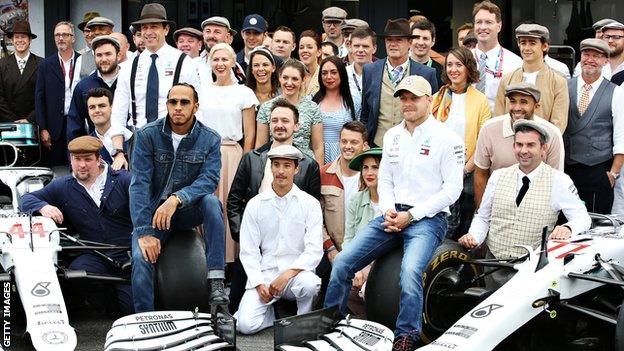
The Mercedes crew were decked out in 1950s' clothing for the entire weekend
Mercedes had spent the weekend celebrating 125 years in motorsport and their 200th F1 grand prix. There were a multitude of nice touches, from a special paint job for the cars, to the team being kitted out in period costumes.
But as their race unravelled, more than a few people were wondering whether the racing gods were paying them back for what some had seen as hubris.
Team boss Toto Wolff described it as "a terrible day" and "an Armageddon weekend".
"It's not embarrassing," he said. "It's motor racing and sometimes you have to take a slap on the chin and learn. These are the days that make us better. We have to think about what went wrong.
"I do believe in the karma thing and when you want to do particularly well sometimes things can go wrong.
"Maybe you can get distracted. Maybe you do things differently than normal. I don't know. We will summarise it rationally tomorrow and write down all the calls we missed or the things we shouldn't have done and progress as a team."
Hamilton said: "Ultimately, it was a combination of things. It is massively upsetting for us to be eight seconds in the lead at one stage. It was like one domino after another. Like snakes and ladders. But we win and lose together.
"It just shows you how easy it is to get a weekend wrong. But we stay united and pull together and regroup and come back fighting for the next one. We were still doing pretty awesome until the domino effect. We need to take the positives and leave all the negatives out. It's only one race and we keep moving forwards."
And stories down the field
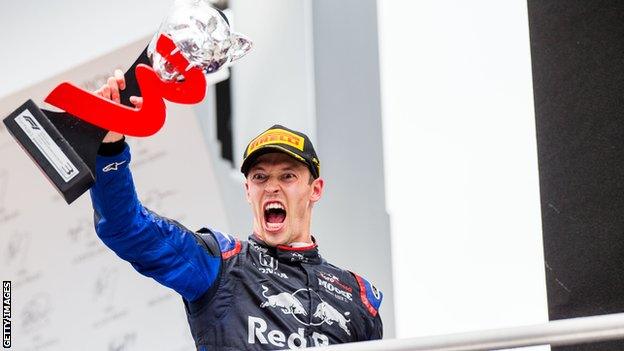
Double celebration: Kvyat also welcomed a baby girl the night before the grand prix
For Bottas, in championship terms, there will surely be no coming back from his error - Hamilton is unlikely to present him with such a great chance again.
And it remains to be seen how it affects the Finn both psychologically and in terms of his future. Wolff is waiting until the looming summer break to decide whether to re-sign Bottas for next year. Crashing out of fourth place, which looked likely to become second, and putting the seal on a bruising weekend for his team can hardly have helped his case.
Elsewhere, Red Bull's strategists underlined their unofficial status as arguably the best in F1 in such situations as they guided the almost-flawless Verstappen to a splendid win, his second in three races.
Sebastian Vettel partly atoned for crashing out of the lead at home last year with a strong drive to second from the back of the grid in the Ferrari, looking becalmed in about seventh place for a long while before coming alive on slicks in the closing laps.
It was a great race for Toro Rosso. Kvyat took a podium, 11 races into his return to a team that sacked him at the 2017 season. And Albon underlined the raw speed and promise he had already shown this season - he was ahead of Kvyat the whole way until he was unlucky to lose out on an even better result than sixth when they rolled the dice for the Russian on the strategy call during the crucial safety car period.
And the Alfa penalty moved Robert Kubica up to the final points position - his first point since his return eight years after the terrible injuries that at one point appeared to have ended his career. Until Germany, he had not been performing as he would have hoped this season. But what a story that is.
As for F1 as a whole, that is now three terrific races in a row in a season that not long ago people were writing off as boring.
Hamilton might have a lock on the title, but this season has so much more to give.
